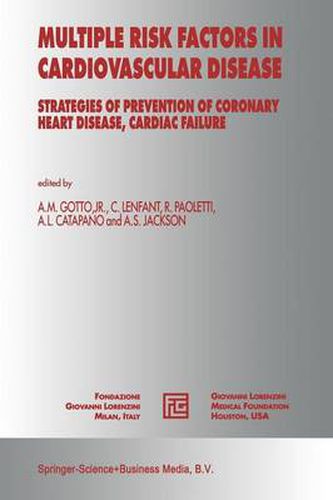Readings Newsletter
Become a Readings Member to make your shopping experience even easier.
Sign in or sign up for free!
You’re not far away from qualifying for FREE standard shipping within Australia
You’ve qualified for FREE standard shipping within Australia
The cart is loading…






This title is printed to order. This book may have been self-published. If so, we cannot guarantee the quality of the content. In the main most books will have gone through the editing process however some may not. We therefore suggest that you be aware of this before ordering this book. If in doubt check either the author or publisher’s details as we are unable to accept any returns unless they are faulty. Please contact us if you have any questions.
This volume is a collection of the most significant contributions to the 4th International Symposium on MULTIPLE RISK FACTORS IN CARDIOVASCULAR DISEASE: STRATEGIES OF PREVENTION OF CORONARY HEART DISEASE, CARDIAC F AlLURE, AND STROKE held in Washington, D. C. in April 1997. The meeting focused on the risk factors for cardiovascular disease and their interactions. The need for this symposium is based on the epidemiological, clinical, and biological evidence that individuals from industrialized countries often possess two or more risk factors which synergistically increase the global risk profile. This has become more evident in recent years with the increase in life expectancy of populations in the industrialized countries. The evidence that a combination of risk factors confers a very high risk of developing cardiovascular diseases, is of pivotal interest in the process of detection of patients who will benefit the most from pharmacological treatment. Many recent epidemiological data identifying the intrinsic and environmental factors contributing to the development of atherosclerosis are discussed. These results, in parallel with basic and clinical research, underline atherosclerosis as a complex and multifactorial process involving the influences of lipids, including lipoprotein subfractions, blood pressure rheologic forces, carbohydrate tolerance, and thrombogenic factors, including fibrinogen, tissue factor, PAl-I, and homocysteine. Furthennore, the risk associated with anyone of these risk factors varies widely depending on the level of the associated atherogenic risk factors. Hyper cholesterolemia and hypertriglyceridemia, for instance, are more common than would be expected by chance among hypertensive patients.
$9.00 standard shipping within Australia
FREE standard shipping within Australia for orders over $100.00
Express & International shipping calculated at checkout
This title is printed to order. This book may have been self-published. If so, we cannot guarantee the quality of the content. In the main most books will have gone through the editing process however some may not. We therefore suggest that you be aware of this before ordering this book. If in doubt check either the author or publisher’s details as we are unable to accept any returns unless they are faulty. Please contact us if you have any questions.
This volume is a collection of the most significant contributions to the 4th International Symposium on MULTIPLE RISK FACTORS IN CARDIOVASCULAR DISEASE: STRATEGIES OF PREVENTION OF CORONARY HEART DISEASE, CARDIAC F AlLURE, AND STROKE held in Washington, D. C. in April 1997. The meeting focused on the risk factors for cardiovascular disease and their interactions. The need for this symposium is based on the epidemiological, clinical, and biological evidence that individuals from industrialized countries often possess two or more risk factors which synergistically increase the global risk profile. This has become more evident in recent years with the increase in life expectancy of populations in the industrialized countries. The evidence that a combination of risk factors confers a very high risk of developing cardiovascular diseases, is of pivotal interest in the process of detection of patients who will benefit the most from pharmacological treatment. Many recent epidemiological data identifying the intrinsic and environmental factors contributing to the development of atherosclerosis are discussed. These results, in parallel with basic and clinical research, underline atherosclerosis as a complex and multifactorial process involving the influences of lipids, including lipoprotein subfractions, blood pressure rheologic forces, carbohydrate tolerance, and thrombogenic factors, including fibrinogen, tissue factor, PAl-I, and homocysteine. Furthennore, the risk associated with anyone of these risk factors varies widely depending on the level of the associated atherogenic risk factors. Hyper cholesterolemia and hypertriglyceridemia, for instance, are more common than would be expected by chance among hypertensive patients.